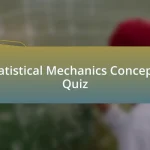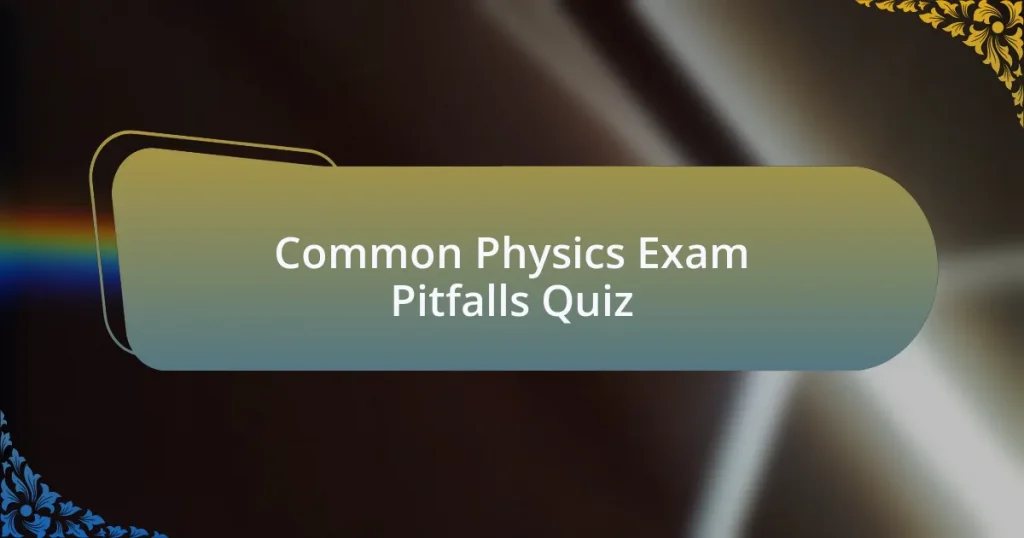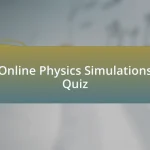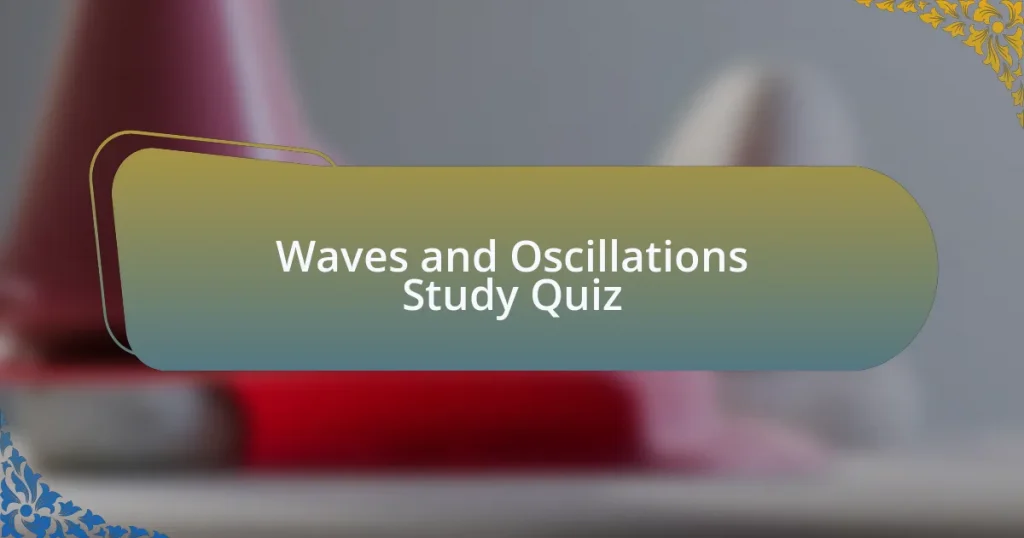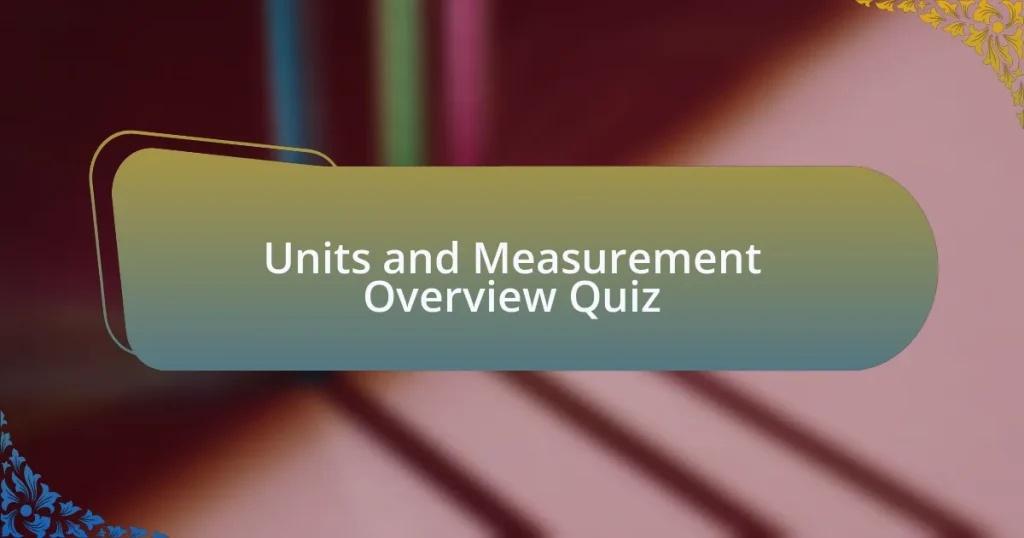Start of Common Physics Exam Pitfalls Quiz
1. What is the most common mistake students make in physics?
- Over-reliance on calculators.
- Ignoring diagrams in problems.
- Focusing only on memorization.
- Misunderstanding the basics of physics.
2. How can students avoid memorizing instead of understanding physics concepts?
- Focus on understanding the `why` behind the equations and study the fundamental principles.
- Rely on practicing problems alone without reviewing concepts.
- Memorize every equation without context to save time.
- Read textbooks without taking notes or summarizing ideas.
3. What is the importance of including units in physics calculations?
- Units are unnecessary in physics calculations and can be ignored.
- Omitting units makes calculations faster without affecting accuracy.
- Including units helps prevent errors and ensures dimensional analysis is correct.
- Including units complicates problem-solving and should be avoided.
4. How can students avoid misinterpreting diagrams in physics problems?
- Skim through diagrams and assume the information is clear.
- Rely solely on textbooks without practicing with real problems.
- Ignore the labels and focus on memorizing facts instead.
- Carefully analyze diagrams, label forces and directions, and break down complex diagrams into simpler components.
5. What are the common assumptions students overlook in physics problems?
- Many assume that all forces acting on an object are known.
- Students frequently ignore numerical approximations in calculations.
- Assumptions such as frictionless surfaces or idealized conditions are often overlooked.
- Students often forget to include gravitational effects in all scenarios.
6. Why is it important to write out every step in problem-solving?
- Writing out every step saves time during the exam.
- Writing out every step is only necessary for complicated problems.
- Writing out every step reduces errors and makes it easier to review and identify mistakes.
- Writing out every step is a waste of paper.
7. How can students ensure they are connecting math and physics properly?
- Relate the mathematical results back to the real-world scenario described in the problem to ensure physical sense.
- Focus only on calculations and ignore physical interpretations.
- Memorize formulas without knowing how to apply them.
- Use advanced mathematical techniques without understanding the physics concepts.
8. Why is consistent practice important in physics?
- Consistent practice only reinforces memorization of formulas and equations.
- Consistent practice distracts from learning new concepts and theories.
- Consistent practice leads to exhaustion and burnout, hindering performance.
- Consistent practice improves problem-solving skills and enhances understanding of the subject.
9. What is the risk of ignoring negative signs and directions in vector calculations?
- Ignoring directions enhances clarity in problems.
- Ignoring negative signs can result in incorrect calculations.
- Ignoring signs simplifies vector calculations.
- Ignoring positive signs will improve answers.
10. How can students avoid cramming before exams?
- Focus solely on memorizing formulas and definitions last minute.
- Only review practice tests the night before.
- Space out study sessions, review material regularly, and use flashcards or summaries for quick reviews.
- Cram all studying into one day before the exam.
11. What is the importance of unit analysis in physics problems?
- Unit analysis helps validate the correctness of the final answer and prevents serious mistakes.
- Unit analysis only applies to chemistry, not physics.
- Unit analysis complicates simple calculations in physics.
- Unit analysis is unnecessary for solving physics problems.
12. Why is conceptual understanding crucial in physics?
- Conceptual understanding is less important than practicing problems repetitively.
- Conceptual understanding connects equations to actual phenomena, making physics theory clearer.
- Memorizing formulas without comprehension can lead to success in exams.
- Focusing solely on calculations is sufficient for mastering physics.
13. What is the common mistake of misapplying formulas in physics?
- Using the wrong units in calculations consistently.
- Misapplying formulas without considering the appropriate context or accuracy of the equations.
- Ignoring the problem`s given values entirely.
- Forgetting to memorize necessary equations at all.
14. How can students ensure their answers are physically plausible in IB Physics exams?
- Only focus on the numerical answer without considering the context.
- Conduct a `reasonableness check` by ensuring answers align with physical limits and possibilities.
- Use arbitrary values for checks that do not relate to the problem.
- Assume all answers are correct without verification of their plausibility.
15. What is the issue with mixing up degrees and radians in physics?
- Degrees and radians are interchangeable.
- It does not matter in basic calculations.
- Mixing units is only a minor issue.
- Mixing units can lead to incorrect results.
16. Why is poor penmanship a problem in IB Physics exams?
- Poor handwriting can make it difficult for examiners to award marks, leading to potential score loss.
- Poor writing style is penalized severely regardless of content.
- Examiners ignore handwriting quality when grading physics exams.
- Clear handwriting guarantees full marks on all questions.
17. What is the common mistake of incorrect memorization of definitions in IB Physics exams?
- Relying solely on rote memorization.
- Focusing on irrelevant details in definitions.
- Misunderstanding the definitions of key terms.
- Confusing definitions with examples of concepts.
18. How can students avoid underestimating the difficulty of IB Physics exam questions?
- Recognize the complexity of questions and allocate sufficient time for each problem.
- Rely solely on study guides without problem-solving.
- Skip difficult questions to focus on easier ones.
- Practice only with the easiest questions available.
19. What is the risk of disregarding the reasonableness of answers in IB Physics exams?
- Disregarding reasonableness has no impact on answers.
- Disregarding reasonableness makes answers more creative.
- Disregarding reasonableness guarantees full marks on exams.
- Disregarding reasonableness leads to incorrect answers.
20. Why is it important to double-check units in final answers?
- Double-checking units ensures correctness in final answers.
- Double-checking units makes answers more complicated.
- Double-checking units is not important in physics.
- Double-checking units is only necessary for equations.
21. What is the common mistake of rushing through the problem-solving process in physics?
- Ignoring formulas leads to simpler problems.
- Rushing through the process can lead to errors and make it harder to resolve mistakes later.
- Overanalyzing each step causes confusion and delays.
- Skipping units helps save time on calculations.
22. How can students ensure they are not overlooking conceptual understanding in physics?
- Memorize all equations without understanding their application.
- Skim through textbook examples without seeking deeper comprehension.
- Focus on understanding the `why` behind the equations and study the fundamental principles.
- Rely solely on practice problems without connecting to concepts.
23. Why is consistent practice important in mastering physics problem-solving skills?
- Consistent practice is unnecessary if you understand the theory well.
- Consistent practice improves problem-solving skills and enhances understanding of the subject.
- Consistent practice makes physics more confusing and hard to learn.
- Consistent practice leads to memorization without understanding concepts.
24. What are the common assumptions students often overlook in physics problems?
- Energy is always conserved without any losses.
- All forces are always in balance in every problem.
- Assumptions such as frictionless surfaces or idealized conditions are often overlooked.
- Gravity is the only force acting on an object at all times.
25. What common assumptions do students often overlook in physics problems?
- Assumptions such as frictionless surfaces or idealized conditions are often overlooked.
- The mass of an object is always constant during motion.
- Objects always travel in a straight line at constant speed.
- Air resistance is negligible in all scenarios.
26. What is the most frequent oversight that students encounter when preparing for physics exams?
- Misunderstanding the basics of physics.
- Ignoring textbook diagrams.
- Memorizing without context.
- Over-reliance on calculators.
27. How can learners deepen their grasp of physics concepts rather than merely memorizing them?
- Read textbooks passively without engaging with the material actively.
- Rely solely on past exam papers for practice without understanding concepts.
- Memorize key formulas and practice them repeatedly without context.
- Focus on understanding the `why` behind the equations and study the fundamental principles.
28. Why is it vital to check for units during calculations in physics assignments?
- Including units helps prevent errors and ensures dimensional analysis is correct.
- Checking units can slow down the calculation process.
- Incorrect units are always corrected automatically by calculators.
- Units are not necessary in physics calculations.
29. What strategies can students employ to accurately interpret diagrams within physics problems?
- Memorize the diagrams instead of understanding their function and context.
- Focus solely on the numerical values without considering the diagram.
- Carefully analyze diagrams, label forces and directions, and break down complex diagrams into simpler components.
- Ignore the details and guess the answers intuitively.
30. What common misconceptions should students be vigilant about when approaching physics questions?
- Overlooking the importance of units.
- Memorizing equations without context.
- Misunderstanding the basics of physics.
- Assuming diagrams are always accurate.
Quiz Completion: Understanding Common Physics Exam Pitfalls
Congratulations on completing the quiz on common physics exam pitfalls! This exercise was designed to highlight some of the frequent mistakes students make while preparing for physics tests. By engaging with this quiz, you’ve likely identified areas where you may improve your understanding of physics concepts and problem-solving techniques.
Throughout this process, you may have learned essential strategies to enhance your exam performance. Recognizing pitfalls such as misinterpreting questions or making careless calculation errors is crucial. These insights will not only help you in exams but also deepen your overall grasp of physics, making the subject more enjoyable and less daunting.
Now that you have completed this quiz, we invite you to explore our next section, which provides comprehensive information on common physics exam pitfalls. This resource can further expand your knowledge and prepare you for future tests. Dive deeper into successful strategies to tackle these challenges head-on and enhance your physics test performance!
Common Physics Exam Pitfalls
Understanding Physics Concepts
Many students struggle with grasping fundamental physics concepts, such as force, energy, and momentum. A lack of deep understanding can lead to incorrect application of formulas and principles during exams. It’s crucial to spend time mastering these concepts through practical examples and problem-solving. When students merely memorize formulas without understanding their derivations, they often get confused during test scenarios that require analytical thinking.
Poor Time Management
Time management is a common pitfall in physics exams. Students often underestimate the time needed for complex problem-solving and end up rushing through questions. Many exams contain multi-part questions that require careful thought and calculation. A strategic approach includes allocating time to each question based on its complexity. Practicing under timed conditions can help students improve their pacing and ensure they allocate sufficient time to every question.
Neglecting Units and Dimensions
Ignoring units can lead to significant mistakes in physics calculations. Students frequently forget to convert units or improperly apply them in formulas. Every physics problem requires attention to the dimensions of quantities involved. For example, confusion between meters and kilometers can drastically affect answers. Constantly checking units during calculations helps in verifying whether the answer is reasonable and can lead to correct final results.
Inadequate Practice with Problem Types
Diverse problem types exist in physics, including qualitative, quantitative, and graphical problems. Students often focus on only certain types, neglecting others. This selective practice can lead to surprises during exams. Comprehensive preparation involves working through a range of problems. This can include past exam questions and differing difficulty levels to prepare for unexpected formats and techniques required for solving them.
Lack of Revision and Review of Mistakes
Failing to review previous mistakes is a common error among physics students. Many do not take the time to analyze errors made in practice problems or mock tests. Revisiting these mistakes helps identify weaknesses and patterns in problem-solving. By understanding where they went wrong, students can adjust their study techniques. This process can significantly improve performance on future exams and reduce the likelihood of repeating the same mistakes.
What are common pitfalls in physics exams?
Common pitfalls in physics exams include misinterpreting questions, neglecting to check units, and overlooking significant figures. Misinterpretation can lead to solving the wrong problem. Not checking units can result in incorrect answers, especially in calculations involving conversions. Overlooking significant figures can affect the precision of results, critical in experiments. According to a study in the “Physics Teacher” journal, students often make these errors, reflecting the importance of attention to detail during exams.
How can students avoid mistakes during physics tests?
Students can avoid mistakes by thoroughly reading questions, practicing problems regularly, and managing their exam time effectively. Reading questions carefully helps ensure comprehension and proper approach. Regular practice strengthens problem-solving skills and familiarizes students with different types of questions. Time management is crucial; as stated in research published in “Educational Research,” poor time management directly correlates with higher error rates in students’ assessments.
Where do students typically lose points in physics exams?
Students typically lose points in physics exams on application-based questions, calculation errors, and conceptual misunderstandings. Application-based questions often require a deeper comprehension of concepts, which students might overlook. Calculation errors are common, especially under time constraints. Conceptual misunderstandings lead to incorrect reasoning, which can significantly impact scores. Data from the American Association of Physics Teachers indicate that these areas account for the majority of lost points in assessments.
When should students start preparing for physics exams?
Students should start preparing for physics exams at least several weeks in advance. This timeline allows for systematic review of material, ample practice, and sufficient time to address weak areas. Research suggests that spaced repetition enhances retention, making early preparation more effective. A study in “Cognitive Science” reveals that students who start early score higher than those who crammed just before exams.
Who can help students improve their physics test performance?
Teachers, tutors, and study groups can significantly help students improve their physics test performance. Teachers provide guidance on difficult concepts and clarify doubts. Tutors can offer personalized attention, addressing specific weaknesses. Study groups encourage collaborative learning, allowing students to learn from each other. Evidence indicates that peer-assisted learning can enhance understanding and retention, leading to better exam outcomes.



